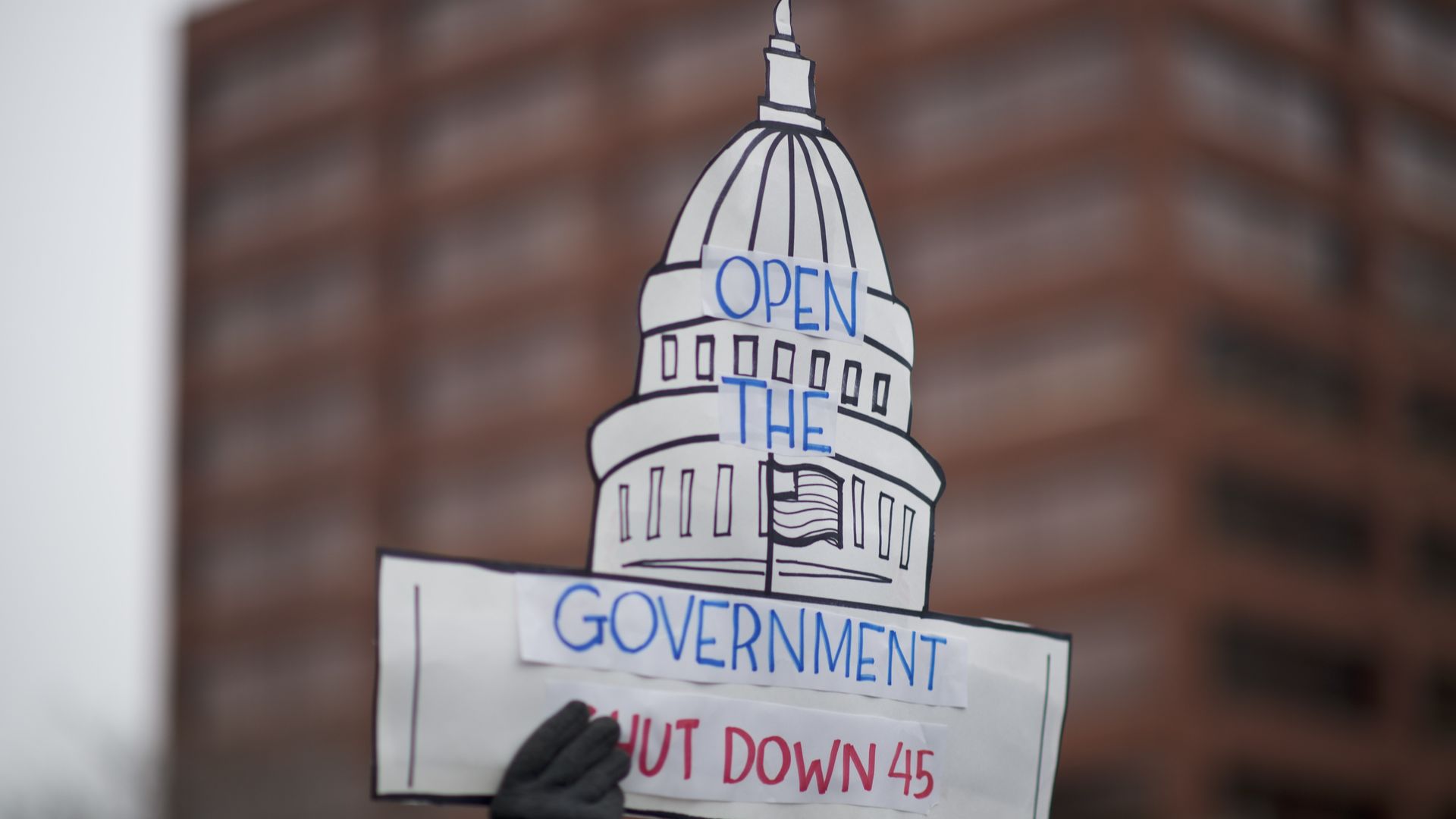
Federal workers protest the government shutdown in Philadelphia. Photo: Mark Makela/Getty Images
With approximately 800,000 federal employees currently out of work — or working without pay — as a result of the 19-day long partial government shutdown, Americans across the country are feeling the effects of reduced government operations.
The big picture: As Axios' Jonathan Swan has reported, White House officials are increasingly worried about the optics of the shutdown and its impact on everyday life across the country.
- Federal paychecks: 800,000 federal workers who are either furloughed or working without pay are set to miss their first paychecks this week.
- The IRS: Tax refunds are set to be paid during the shutdown, according to the White House's Office of Management and Budget, but it's unclear if the administration has legal standing for this position.
- Airports: Hundreds of TSA agents have called in sick to at least four major airports after being forced to work without pay, affecting air travel safety. The Miami airport was forced to close one terminal early for 3 days due to TSA absences. And the nation's largest pilot union told Trump the shutdown is "affecting the safety, security and efficiency of our national airspace system."
- Food stamps: The 38 million Americans who depend on federal assistance could see their aid reduced — or run out entirely. The Department of Agriculture announced Tuesday that it has found a way to continuing providing food stamps during the month of February.
- Federal housing: The Dept. of Housing and Urban Development may have difficulty sustaining rental assistance payments, which could put millions of tenants at risk.
- Immigration: Federal immigration courts have to pick and choose which cases to handle as the shutdown continues, which could cause years-long delays.
- Farmers: Emergency aid from the Department of Agriculture for farmers impacted by the trade war between China and the U.S. could be disrupted.
- Science: The National Science Foundation, National Institutes of Standards and Technology, NOAA, NASA and the U.S. Geological Survey are all affected, delaying key research, lectures and conferences.
- Economic data: The Federal Reserve may not have access to federal economic data, including the government's retail sales report, GDP and durable goods during the shutdown, which could affect its forthcoming decisions on interest rate hikes.
- Cybersecurity: Federal workers in cybersecurity who have been deemed essential are tasked with maintaining security across government networks despite reduced staffing.
- National parks: After a buildup of trash in some of the nation's most popular public destinations, officials at the Interior Department authorized using entrance fees to cover park operations — like restroom cleanings, park patrol and trash pickup — for the first time in history. Vulnerable Joshua trees in Joshua Tree National Park in California were cut down by visitors who illegally drove into areas where vehicles are banned.
- Native Americans: Tribes nationwide have been forced to use their own funds to keep their health care systems and food pantries running after federal funding was cut off.
- Banks: Banks like Wells Fargo, Chase and Capital One are forgiving late payments and service fees from federal workers.
- IPOs: The SEC can't declare new registrations effective or provide feedback on confidential filings as a record of unicorn startups — like Slack, Uber and Lyft —are preparing IPOs.
- Food safety: The Food and Drug Administration has suspended all routine inspections of domestic food-processing facilities, meaning the food most Americans eat could potentially be less safe and cause an increase in foodborne illnesses.
- U.S. credit rating: Fitch Ratings warned it could re-evaluate the U.S.'s triple-A credit rating if the government shutdown continues until March 1.
- Federal Communications Commission: New gadgets for 2019 such as cellphones, smart appliances or "smart home" gadgets can’t be marketed or sold without FCC authorization. The agency is furloughed due to the shutdown.
- FBI agents: The shutdown is starting to affect operations such as pay freezes that make it harder for the agency to recruit and retain agents, the FBI Agents Association said. Friday is the first day agents will go without getting paid.
- Coast Guard: More than 55,000 active duty Coast Guard employees and 50,000 retirees are not being paid. And if they die in the line of duty, their family service members will not be provided death benefits as long as the shutdown continues, CNN reports.
Go deeper: The force that could end the shutdown
